The Darling
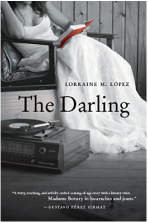
Latina bibliophile Caridad falls out of love again and again, with much help from Anton Chekhov, Gustave Flaubert, Theodore Dreiser, D. H. Lawrence, Vladimir Nabokov, Thomas Hardy, and other deceased white men of letters. Raised in a household of women, she rejects examples of womanhood offered by her long-suffering mother, her caustic eldest sister Felicia, and her pliant and sentimental middle sister Esperanza. Instead Caridad, a compulsive reader, educates herself about love and what it means to be a sentient and intelligent woman by reading classic literature written by men, and supplements this with life lessons gleaned from her relationships.
Though set in Los Angeles from the mid-1970s to the mid-1980s, the narrative reinscribes Anton Chekhov's short story, "The Darling," first published in 1899. Like Chekhov's protagonist, Caridad engages in various relationships in her search for love and fulfillment. Rather than absorbing beliefs held by the men in her life, as does Chekhov's heroine, Caridad instead draws on her lovers' resources in attempting to improve and educate herself. Apart from Chekhov, various authors of classic literature further guide Caridad's quest to find herself and to find love, inspiring her longing for love, while also enabling her to disentangle herself from unsatisfying to disastrous relationships by encouraging her to strive for an ideal.
In a moment of clarity, Caridad compares herself to a trapeze artist near the top of a striped tent as she flies from one man to the next, expecting to be caught and held until she is ready to leap again. Flying, she wonders—or is she falling?
Though set in Los Angeles from the mid-1970s to the mid-1980s, the narrative reinscribes Anton Chekhov's short story, "The Darling," first published in 1899. Like Chekhov's protagonist, Caridad engages in various relationships in her search for love and fulfillment. Rather than absorbing beliefs held by the men in her life, as does Chekhov's heroine, Caridad instead draws on her lovers' resources in attempting to improve and educate herself. Apart from Chekhov, various authors of classic literature further guide Caridad's quest to find herself and to find love, inspiring her longing for love, while also enabling her to disentangle herself from unsatisfying to disastrous relationships by encouraging her to strive for an ideal.
In a moment of clarity, Caridad compares herself to a trapeze artist near the top of a striped tent as she flies from one man to the next, expecting to be caught and held until she is ready to leap again. Flying, she wonders—or is she falling?
Soy La Avon Lady and Other Stories
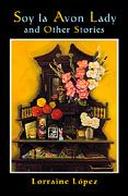
"Soy la Avon Lady and Other Stories," is a stunning debut collection of short stories that explore identity issues in the Latino community. The cast of characters in her stories include a young boy-impelled by his guilt over failing to prevent his parents' divorce-who seeks to save an abandoned baby, an elderly man attempting to invoke his dead wife by regularly donning her clothing and make-up, a former National Guardsman whose failed attempts to connect with his family do not prevent him from trying, and a young woman determined to give birth to her murdered lover's child. In the title story, an aging Avon representative, who is often mistaken for a transvestite, has become so estranged from the Spanish language she spoke as a child that she no longer remembers that she spoke it or what happened in her childhood. Many of the characters in these stories must negotiate differences in race, culture, language, class, and gender in attempts to discover who they are and where they are going. Lopez's vivid characters struggle both to find a place of belonging and companions who can accept them, as well as self-forgiveness for the compromises they made in living necessarily bifurcated lives as they attempt to breech the gap between cultures.
Sandra Cisneros, in awarding the Miguel Marmol prize to "Soy la Avon Lady and Other Stories," noted, "I was impressed with the mastery of the story-telling, the swiftness of movement, the voices, the characters-really wonderful. The characters were zingers, the dialogue sharp, the motion quick."
Sandra Cisneros, in awarding the Miguel Marmol prize to "Soy la Avon Lady and Other Stories," noted, "I was impressed with the mastery of the story-telling, the swiftness of movement, the voices, the characters-really wonderful. The characters were zingers, the dialogue sharp, the motion quick."
Call Me Henri
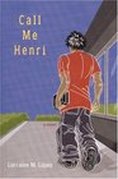
Enrique, a young boy in Peralta Middle School, faces abuse at home and danger on the barrio streets. Yet he is driven to succeed by the desire to join that "other America" he sees on TV and in the movies, and is aided in his quest by compassionate teachers. His ambition finds expression in his determination to drop his ESL class in favor of taking French, and his story begins, "Call me Henri--."
Lorraine Lopez has created a vivid picture of barrio life, filled with honesty, insight, and humor for young adults. She paints a balanced and detailed landscape of Enrique's world. Although Enrique is confused and angered by his mother's refusal to stand up for him against the abuse of his stepfather, he also draws strength from the supportive and loving family of his friend Francisco. While some of his teachers are uncaring or inept, others provide help and encouragement at critical moments in his life.
When Enrique witnesses his friend Horacio gunned down in a drive-by shooting and is seen by the assailants, gang members set out to kill him. As the novel reaches its climax, Enrique must make some agonizing decisions.
Although specifically about barrio life, this novel is universal in its themes-the drive for success, the desire for love and family support, and the need for true friendship. Lopez's fully delineated characters provide a rich and credible mural of our human comedy.
Lorraine Lopez has created a vivid picture of barrio life, filled with honesty, insight, and humor for young adults. She paints a balanced and detailed landscape of Enrique's world. Although Enrique is confused and angered by his mother's refusal to stand up for him against the abuse of his stepfather, he also draws strength from the supportive and loving family of his friend Francisco. While some of his teachers are uncaring or inept, others provide help and encouragement at critical moments in his life.
When Enrique witnesses his friend Horacio gunned down in a drive-by shooting and is seen by the assailants, gang members set out to kill him. As the novel reaches its climax, Enrique must make some agonizing decisions.
Although specifically about barrio life, this novel is universal in its themes-the drive for success, the desire for love and family support, and the need for true friendship. Lopez's fully delineated characters provide a rich and credible mural of our human comedy.
The Gifted Gabaldon Sisters
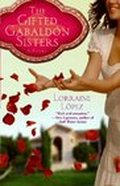
Having lost their mother in early childhood, the Gabaldón sisters consider Fermina, their elderly Pueblo housekeeper, their surrogate Grandmother. The mysterious Fermina love the girls as if they are her own, and promises to endow each with a "special gift" to be received upon her death.
Mindful of the old woman's mystical ways, the sisters believe Fermina's gifts, bestowed based on their natural talents, magically enhance their lives. The oldest sister, Bette Davis Gabaldón, always teased for telling tales, believes her gift is the power to persuade anyone, no matter how outlandish her story. Loretta Young, who often prefers pets to people, assumes her gift is the ability to heal animals. Tough-talking tomboy, Rita Hayworth believes her gift is the ability to curse her enemies. And finally, Sophia Loren, the baby of the family, is sure her ability to make people laugh is her legacy.
As the four girls grow into women they discover that Fermina's gifts come with complicated strings, and what once seemed simple can confuse over time. Together they learn the truth about their mysterious caretaker, her legacy, and the family secret that was nearly lost forever in the New Mexican desert.
Mindful of the old woman's mystical ways, the sisters believe Fermina's gifts, bestowed based on their natural talents, magically enhance their lives. The oldest sister, Bette Davis Gabaldón, always teased for telling tales, believes her gift is the power to persuade anyone, no matter how outlandish her story. Loretta Young, who often prefers pets to people, assumes her gift is the ability to heal animals. Tough-talking tomboy, Rita Hayworth believes her gift is the ability to curse her enemies. And finally, Sophia Loren, the baby of the family, is sure her ability to make people laugh is her legacy.
As the four girls grow into women they discover that Fermina's gifts come with complicated strings, and what once seemed simple can confuse over time. Together they learn the truth about their mysterious caretaker, her legacy, and the family secret that was nearly lost forever in the New Mexican desert.
Homicide Survivors Picnic
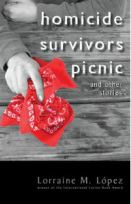
"In a voice that is all at once hilarious and mischievous, searing and seething and sardonic, Lorraine Lopez presents, in her most necessary book to date, a celebration of the liberating power of bad behavior," writes Heather Sellers about HOMICIDE SURVIVORS PICNIC AND OTHER STORIES. Most of the stories are set in the South and focus around family relationships, by birth and choice, among characters from Latino and other backgrounds. Lydia, a childless linguist, takes care of her precious four-year-old niece while the mother faces jail. Social worker Rita rents the empty half of her duplex to her loser ex-husband, with disastrous results. And in the title story, teenager Ted winds up attending a homicide survivor's picnic with his sister, who is mourning her recently slain boyfriend whom Ted barely knew. "We are moved by her characters' difficult dilemmas without being traumatized," writes Lynn Pruett. And Manuel Munoz agrees, "All of the refined and subtle humor we've come to expect from Lopez.... A marvelous collection."
An Angle of Vision
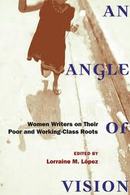
An Angle of Vision is a compelling anthology that collects personal essays and memoir by a diverse group of gifted authors united by their poor or working-class roots in America. The contributors include Dorothy Allison, Joy Castro, Lisa D. Chavez, Mary Childers, Sandra Cisneros, Judith Ortiz Cofer, Teresa Dovalpage, Maureen Gibbon, Dwonna Goldstone, Joy Harjo, Lorraine M. López, Karen Salyer McElmurray, Amelia Maria de la Luz Montes, Bich Minh Nguyen, Judy Owens, Lynn Pruett, Heather Sellers, and Angela Threatt.
In a sense, these stories are the travel narratives of women who have journeyed beyond their family circumstances to cross class borders, aided by educational opportunities that encouraged their literary gifts to blossom. Many of the essays reflect on the immigrant experience and struggles against the multiplying factors of poverty, gender, and ethnicity. Some authors recount their first moment of class awareness (Bich Minh Nguyen's occurred while watching Laverne and Shirley on the family's first television). Still others describe encounters in the relatively privileged world of higher education—where the subject of class is evident but mostly off-limits. Throughout An Angle of Vision the authors describe delicate balances of work and family, men and money, motherhood and sexuality. Each author reflects on the experiences that provided an opportunity to develop her own distinct identity and her own particular "angle of vision."
In a sense, these stories are the travel narratives of women who have journeyed beyond their family circumstances to cross class borders, aided by educational opportunities that encouraged their literary gifts to blossom. Many of the essays reflect on the immigrant experience and struggles against the multiplying factors of poverty, gender, and ethnicity. Some authors recount their first moment of class awareness (Bich Minh Nguyen's occurred while watching Laverne and Shirley on the family's first television). Still others describe encounters in the relatively privileged world of higher education—where the subject of class is evident but mostly off-limits. Throughout An Angle of Vision the authors describe delicate balances of work and family, men and money, motherhood and sexuality. Each author reflects on the experiences that provided an opportunity to develop her own distinct identity and her own particular "angle of vision."
The Other Latin@
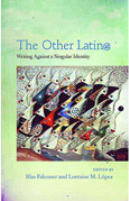
The sheer number of different ethnic groups and cultures in the United States makes it tempting to classify them according to broad stereotypes, ignoring their unique and changing identities. Because of their growing diversity within the United States, Latinas and Latinos face this problem in their everyday lives. With cultural roots in Mexico, Puerto Rico, Cuba, the Dominican Republic, or a variety of other locales, Hispanic-origin people in the United States are too often consigned to a single category. With this book Blas Falconer and Lorraine M. López set out to change this.
The Other Latin@ is a diverse collection of essays written by some of the best emerging and established contemporary writers of Latin origin to help answer the question: How can we treat U.S. Latina and Latino literature as a definable whole while acknowledging the many shifting identities within their cultures? By telling their own stories, these authors illuminate the richness of their cultural backgrounds while adding a unique perspective to Latina and Latino literature.
This book sheds light on the dangers of abandoning identity by accepting cultural stereotypes and ignoring diversity within diversity. These contributors caution against judging literature based on the race of the author and lament the use of the term Hispanic to erase individuality. Honestly addressing difficult issues, this book will greatly contribute to a better understanding of Latina and Latino literature and identity.
The Other Latin@ is a diverse collection of essays written by some of the best emerging and established contemporary writers of Latin origin to help answer the question: How can we treat U.S. Latina and Latino literature as a definable whole while acknowledging the many shifting identities within their cultures? By telling their own stories, these authors illuminate the richness of their cultural backgrounds while adding a unique perspective to Latina and Latino literature.
This book sheds light on the dangers of abandoning identity by accepting cultural stereotypes and ignoring diversity within diversity. These contributors caution against judging literature based on the race of the author and lament the use of the term Hispanic to erase individuality. Honestly addressing difficult issues, this book will greatly contribute to a better understanding of Latina and Latino literature and identity.
The Realm of Hungry Spirits
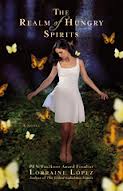
In Buddhism, there is a place where hungry souls gather between lives awaiting rebirth so they can finally satisfy the desires that haunt them.
In the San Fernando Valley, that place is Marina Lucero's house.
For Marina Lucero, whose father transformed his life through meditation and whose mother gave hers to a Carmelite convent, spirituality should come easily. It doesn't. After a devastating relationship leaves her feeling lost and alone, she opens her home to a collection of wayward souls-- the abused woman next door and her alcoholic sister, her aimless nephew and his broken-hearted best friend. Her house now full but her heart still empty, Marina then turns to the wisdom of Gandhi, the Dalai Lama, even a Santeria priest who wants to cleanse her home.
As Marina struggles to balance the disappointments and delights of daily life, she'll learn that, when it comes to inner peace and those we love, a little chaos can lead to a lot of happiness.
In the San Fernando Valley, that place is Marina Lucero's house.
For Marina Lucero, whose father transformed his life through meditation and whose mother gave hers to a Carmelite convent, spirituality should come easily. It doesn't. After a devastating relationship leaves her feeling lost and alone, she opens her home to a collection of wayward souls-- the abused woman next door and her alcoholic sister, her aimless nephew and his broken-hearted best friend. Her house now full but her heart still empty, Marina then turns to the wisdom of Gandhi, the Dalai Lama, even a Santeria priest who wants to cleanse her home.
As Marina struggles to balance the disappointments and delights of daily life, she'll learn that, when it comes to inner peace and those we love, a little chaos can lead to a lot of happiness.
Rituals of Movement in the Writing of Judith Ortiz Cofer
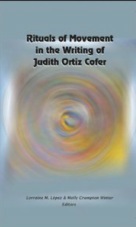
Rituals of Movement in the Writing of Judith Ortiz Cofer is the first book-length collection of scholarship on the writing of Judith Ortiz Cofer and establishes her as an important contemporary American author. Ten analytical essays and four interviews explore the complexity and originality of her work and her central themes of Puerto Rican identity, cross-cultural experience, and the female perspective in a shifting multicultural world. This collection discusses almost all of Ortiz Cofer s writing, including her most popular and influential works such as Silent Dancing, The Latin Deli, and A Love Song Written in Spanish. This book is organized into sections that highlight her achievements in prose, poetry, and the mixed-genre writing that is a major innovative contribution to American letters.
